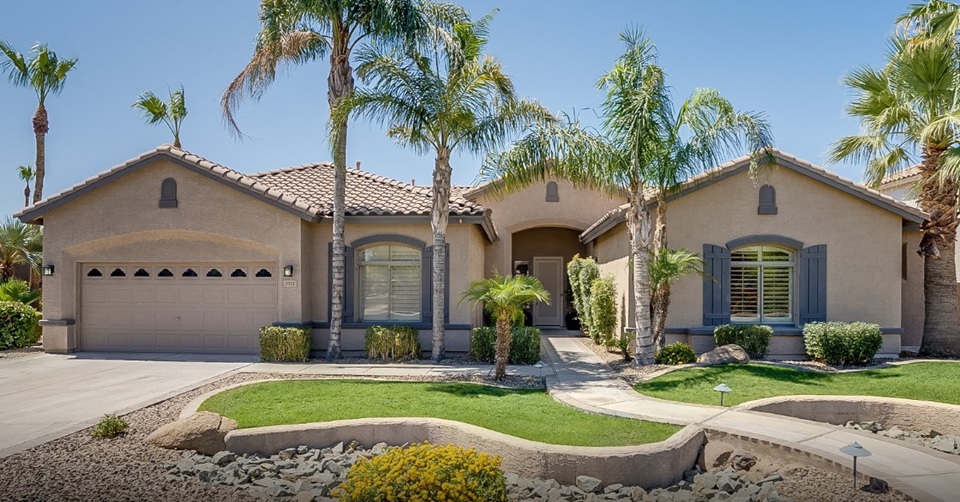Drawn by endless sunshine and wide-open skies, thousands are relocating to Arizona. Whether you’re eyeing suburban Phoenix, historic Tucson, or the state’s scenic mountain towns, Arizona blends stunning desert landscapes with vibrant urban centers.
To navigate its dynamic housing market, you need the right information. This guide simplifies your search, covering everything from key market data and seasonal buying tips to local lingo and legal updates to help you find your perfect Arizona home.
What Does the Housing Market in Arizona Look Like?
The Arizona housing market is currently recalibrating, presenting a complex picture for potential buyers. As of mid-2025, the average home value is $430,710, which reflects a modest 2.7% decrease over the past year. Homes are moving at a steady pace, typically going under contract in about 34 days.
With an active inventory of just over 40,000 homes statewide, approximately 15% of properties are still selling for more than their list price. This indicates that while buyers have more breathing room than in previous years, strong demand continues to define the market.
How Does the Housing Market in Tucson Compare?
The Tucson housing market offers a more accessible entry point compared to other Arizona hubs. As of mid-2025, the average home value is approximately $331,789. Homes here also sell more quickly than the state average, typically going under contract in about 25 to 33 days.
Tucson blends Southwestern heritage with an outdoor lifestyle. Expect Spanish‑style architecture, seasonal humidity, and events like the Tucson Gem and Mineral Show each February that briefly boost visitor demand.
How to Find the Right Neighborhood?
Choosing the right neighborhood is just as important as choosing the right house. Here’s a strategic approach to finding your perfect fit in Arizona.
- Define Priorities
Start by making a “must-have” list. Consider key factors like school district ratings, commute times, and proximity to amenities like parks, shopping, and healthcare. Your priorities will quickly narrow your search. For instance, if you’re seeking resort-style living with upscale amenities, focus on cities like Scottsdale and Tempe. If you prefer cooler summers and mountain air, Flagstaff is the obvious choice. - Check Local Lingo
Understanding local terminology is important for navigating online forums and neighborhood discussions. For example, the greater Phoenix area is often called the “Valley of the Sun.” Knowing these localisms will help you connect with community conversations and gather authentic insights - Use City Data
Once you have a shortlist of neighborhoods, dig into the data. Use official city and county websites to research key statistics like crime rates, school performance, and walk scores. Also, check details like flood zones and HOA boundaries, ensuring there are no surprises after you buy.
What Drives Arizona’s Housing Market?
From the monsoon season in June to September to winter’s mild days, weather determines listing volumes. Sales slow during summer’s peak heat. Listings tend to increase in late fall as sellers aim for year-end closings. From tax credits in Pinal County to preservation rules in Prescott, every area brings something different to the table.
Major employers like Arizona State University in Tempe, Raytheon in Tucson, and Intel’s upcoming Chandler plant draw workers and drive demand. Factor in new office developments near Mesa and Phoenix-Mesa Gateway Airport.
Are There Legal Updates That Impact Buyers?
Recent legal and regulatory actions have changed the homebuying process in Arizona. Here’s what you need to be aware of:
- New Buyer-Broker Agreements Are Mandatory: Following the nationwide NAR settlement, Arizona now requires a signed buyer-broker agreement before an agent can show you properties. This formalizes your relationship and requires an upfront discussion about agent commissions.
- Increased Enforcement of Fair Housing Laws: A recent lawsuit filed by the Arizona Attorney General for Fair Housing Act violations in June 2025 signals heightened scrutiny in the state. This makes it important for buyers to carefully review all HOA and rental-related rules before purchasing.
- Accountability for Real Estate Tech Companies: Major companies are also being held accountable. Opendoor’s recent $39 million settlement over misleading pricing claims serves as a warning to buyers to be critical of automated home valuations.
How to Compare Listings Efficiently
- Start searching for your new home on the MLS and aggregator sites.
- Set alerts for new listings and price changes.
- Schedule showings early in the week, as prices often adjust by Friday.
- Visit at different times to gauge noise, traffic, and neighborhood activity.
Platforms like Houzeo – America’s best home buying and selling website feature 82.8K homes for sale in Arizona. You can filter through them based on price, amenities, beds and baths, etc.
Factoring Seasonal Trends
- Spring (April–May) is the peak season. This is when inventory surges, offering buyers the widest selection of homes. Be prepared for stiff competition, as this is when the market is most active.
- Summer (June–August) brings a strategic slowdown. The intense heat leads to fewer listings and less foot traffic. While choice is more limited, sellers who list often find highly motivated buyers, and buyers face less competition.
- Fall (September–November) is the balanced season. The market finds a comfortable equilibrium with a steady stream of new listings and serious buyers aiming to close a deal before the holidays.
- Winter (December–February) presents an opportunity for deals. While this is the quietest period with the fewest listings, it also means less competition. Savvy buyers can find great deals from sellers facing year-end pressure.
Conclusion
Considering a move to Arizona? The state offers abundant sunshine, scenic landscapes, and a variety of housing options. But every city is a little different. Some areas provide tax breaks, while others have specific building regulations.
To make it easy, you can search for homes in Arizona on America’s best property search app. You can look at houses, schedule showings, and submit offers right from the convenience of your phone.









